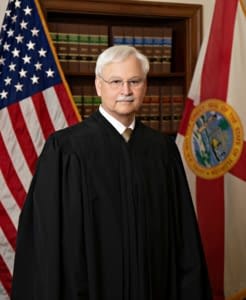Legislative Update: Senate Committee Hearing 3/20; Justice Polston Resigns
Update after the Senate Criminal Justice Committee hearing on the Senate’s capital sexual battery bill (SB 1342). Also, Justice R. Polston of the Florida Supreme Court has submitted his resignation.
Another day with a lot happening. It appears I chose the “right” time to start this blog because every day brings something new.
Capital Sexual Battery Legislative Update
Yesterday afternoon, the Senate Criminal Justice Committee heard the Senate’s capital sexual battery bill (SB 1342). For more on this proposed legislation and the background, see this post.
A video of the hearing can be found here.
This one had quite a bit of interesting discussion. It’s not a boring one to watch if you’re interested.
The obvious justification for the bill is to protect children in the state. No one disagrees that these are heinous crimes.
The debate elucidated some interesting reasoning in support of this bill. For instance, the Chair and sponsor of the bill, Senator Jonathan Martin, suggested that wrongful convictions are less likely in these crimes because the victims are alive and can identify the perpetrators. In the same breath, Martin recognized that some murder victims’ families can’t testify because of the trauma—but did not apply the same reasoning to these crimes.
Another interesting comment was when a Committee member suggested that this bill would deter these crimes in the state and suggested that future perpetrators go to other states.
U.S. Supreme Court Precedent
The elephant in the room with this legislation is that U.S. Supreme Court precedent (namely, its decision in Kennedy v. Louisiana) directs that this legislation violates the Eighth Amendment. As written, both the House and Senate bill declare that Kennedy was wrongly decided.
The discussion made clear that legislators believe that if this legislation is passed and ultimately challenged, the current U.S. Supreme Court would overturn Kennedy and uphold this legislation.
The basis: Justice Alito’s dissent. The discussion suggested that Justice Alito is the only justice that remains on the Court from Kennedy. That’s not accurate. Instead, it’s that they think Justice Alito’s dissent will become the majority opinion based on the change in the Court. Justices Roberts and Thomas joined Alito’s dissent and remain on the Court.
Justice Kennedy wrote the majority opinion, joined by Justices Stevens, Souter, Ginsburg, and Breyer.
The sponsors of the bill seem confident that the current Court would uphold the legislation.
Capital Sentencing
Two interesting pieces of information came out of today’s hearing on the capital sentencing front.
First, we learned that the intent is for the sentencing procedure in the capital sexual battery bill and the primary capital sentencing bill to be the same. As they currently exist, they are not. However, Senator Ingoglia (the sponsor of the Senate bill seeking to amend Florida’s existing capital sentencing scheme) indicated an amendment is forthcoming on the capital sentencing bill. The end goal is that the trial judge will have discretion to impose a sentence of death as long as at least 8 jurors vote to recommend death. Stay tuned for that amendment.
Second, it was confirmed—although without much detail—that the bill’s requirement of two aggravating factors is to provide additional “safeguards” for sentences of death imposed under it. (I discussed this further in the post about the Amendment.)
Aggravating Factors
Aggravating factors got a lot of attention during the hearing. Because this bill seeks to implement a separate sentencing scheme for these crimes, it includes its own set of aggravating factors and mitigating circumstances. Some of the aggravating factors are specific to the capital sexual battery crimes.
Based on the discussion at the hearing, it is likely we will see an amendment to this bill. Senator Bradley noted that Justice Alito’s dissenting opinion in Kennedy outlined aggravating factors that he thought would be appropriate for sufficiently narrowing the death penalty for these crimes. There was some discussion about amending the bill to closer align with Justice Alito’s opinion.
The Committee voted unanimously to approve the bill.
Justice Polston Resigns
On Monday, March 20, 2023, Justice Ricky Polston submitted his resignation to Governor DeSantis effective March 31, 2023. Justice Polston has been on the Supreme Court of Florida since 2008 when he was appointed by Governor Charlie Crist. He served as chief justice for the 2012-2014 term.1
As far as capital sentencing goes, he is one of the few justices who remain on the Court since the U.S. Supreme Court held in 2016 in Hurst v. Florida that Florida’s capital sentencing scheme violated capital defendants’ right to jury trial under the Sixth Amendment. (Stay tuned for Part II of the five-part series explaining what happened in 2016 coming soon. Below is a little preview.)
On remand from the U.S. Supreme Court’s decision, Justice Polston joined in Justice Canady’s dissent in Hurst II, which argued that all the U.S. Supreme Court’s decision required was a jury’s unanimous decision that the state proved beyond a reasonable doubt the existence of one aggravating factor.
He was then in the majority in 2020 in Poole v. State when that decision became the majority and the Court overturned its decision in Hurst II.
The reason for his resignation is unclear. Justice Polston is 67, meaning he still had several years of eligibility to serve on the Court under the Florida Constitution. Article V, section 8, of the Florida Constitution provides that “[n]o justice or judge shall serve after attaining the age of seventy-five years except upon temporary assignment.”
Governor DeSantis reacted to Justice Polston’s resignation with the following tweet on Monday afternoon:
While serving on the Court, Justice Polston has long served as a professor at the FSU College of Law, teaching Florida Constitutional Law and other classes.





